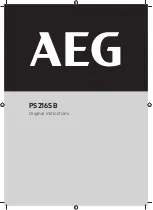
5
produce narrow kerf causing excessive friction,
blade binding and kickback.
•
Blade depth and bevel adjusting locking
levers must be tight and secure before
making cut.
If blade adjustment shifts while
cutting, it may cause binding and kickback.
•
Use extra caution when making a "plunge
cut" into existing walls or other blind areas.
The protruding blade may cut objects that can
cause kickback.
10.
Check lower guard for proper closing before
each use. Do not operate the saw if lower
guard does not move freely and close instantly.
Never clamp or tie the lower guard into the
open position.
If saw is accidentally dropped,
lower guard may be bent. Raise the lower guard
with the retracting handle and make sure it moves
freely and does not touch the blade or any other
part, in all angles and depths of cut.
11.
Check the operation of the lower guard spring.
If the guard and the spring are not operating
properly, they must be serviced before use.
Lower guard may operate sluggishly due to
damaged parts, gummy deposits, or a build-up of
debris.
12.
Lower guard should be retracted manually
only for special cuts such as "plunge cuts"
and "compound cuts." Raise lower guard by
retracting handle and as soon as blade enters
the material, the lower guard must be released.
For all other sawing, the lower guard should
operate automatically.
13.
Always observe that the lower guard is
covering the blade before placing saw down
on bench or floor.
An unprotected, coasting
blade will cause the saw to walk backwards,
cutting whatever is in its path. Be aware of the time
it takes for the blade to stop after switch is
released.
14.
ALWAYS hold the tool firmly with both hands.
NEVER place your hand or fingers behind the
saw.
If kickback occurs, the saw could easily jump
backwards over your hand, leading to serious
personal injury.
000194
15.
Never force the saw. Push the saw forward at a
speed so that the blade cuts without slowing.
Forcing the saw can cause uneven cuts, loss of
accuracy, and possible kickback.
16.
Use extra caution when cutting damp wood,
pressure treated lumber, or wood containing
knots.
Adjust speed of cut to maintain smooth
advancement of tool without decrease in blade
speed.
17.
Do not attempt to remove cut material when
blade is moving. Wait until blade stops before
grasping cut material.
CAUTION: Blades coast
after turn off.
18.
Avoid Cutting Nails. Inspect for and remove all
nails from lumber before cutting.
19.
Place the wider portion of the saw base on that
part of the workpiece which is solidly
supported, not on the section that will fall off
when the cut is made. As examples, Fig. 1
illustrates the RIGHT way to cut off the end of
a board, and Fig. 2 the WRONG way. If the
workpiece is short or small, clamp it down. DO
NOT TRY TO HOLD SHORT PIECES BY HAND!
Fig. 1
000147
Summary of Contents for 5902B
Page 10: ...10 ...
Page 11: ...11 ...
Page 12: ...12 Makita Corporation Anjo Aichi Japan www makita com 884289C6 ...






























